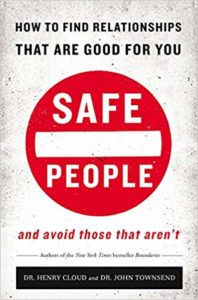Safe People, by Henry Cloud and John Townsend
 God created us to be in relationship, and relationships can be hurtful and/or healing. Healthy relationships are essential for us to flourish.
God created us to be in relationship, and relationships can be hurtful and/or healing. Healthy relationships are essential for us to flourish.
But what are healthy relationships, and how do we find them?
Cloud and Townsend, the co-authors of Boundaries, answer that question in Safe People.
They start by defining unsafe people, who generally fall into three categories: the abandoners, the critics, and the irresponsibles. Here’s a partial list of the twenty traits of unsafe people.
Personal traits (who we are) of unsafe people:
- Unsafe people think they ‘have it all together’ instead of admitting their weaknesses.
- Unsafe people are defensive instead of open to feedback.
- Unsafe people are self-righteous instead of humble.
- Unsafe people avoid working on their problems instead of dealing with them.
- Unsafe people demand trust, instead of earning it.
- Unsafe people blame others instead of taking responsibility.
- Unsafe people lie instead of telling the truth.
Interpersonal traits (how we connect) of unsafe people:
- Unsafe people avoid closeness instead of connecting.
- Unsafe people resist freedom instead of encouraging it.
- Unsafe people flatter us instead of confronting us.
- Unsafe people condemn us instead of forgiving us.
- Unsafe people stay in parent/child roles instead of relating as equals.
- Unsafe people gossip instead of keeping secrets.
We may choose unsafe relationships for a variety of reasons, including: isolation, fear of confrontation, romanticizing, rescuing, and familiarity, among others.
Against the backdrop of unsafe people, Cloud and Townsend use Jesus as the ultimate example of a safe person because he embodies dwelling (connection), grace, and truth.
They say churches—as a whole—can be safe or unsafe. A safe church looks like this:
- Grace is preached from the pulpit and is the foundation for how people are to be treated.
- Truth is preached without compromise, but also without a spirit of law and judgment.
- The church leaders are aware of their own weakness and need to grow and are open about their hurt, pain, failings, and humanity.
- The culture is one of forgiven sinners, not self-righteous Pharisees.
- The teaching sees brokenness, struggle, and inability as normal parts of the sanctification process.
How do we pick healthy friendships? Several qualities are important:
- Acceptance and grace
- Mutual struggles, although they do not have to be the same ones
- Loving confrontation
- Both parties have ‘entered in’ to a growth process
- An absence of ‘one-up and one-down’ dynamics
- Both parties in a relationship with God
- Honesty and reality instead of ‘over-spiritualizing’
- An absence of controlling behavior
But it’s not just about finding safe people. More importantly, it’s about becoming a safe person.
How do we become a safe person? By practicing these six steps:
- ask for help,
- learn to need,
- work through resistances,
- invite the truth about yourself,
- enter into forgiveness, and
- give something back.
And by asking these two questions to your safe people:
- What do I do that pushes you away from me?
- What do I do that draws you toward me?
As we become safe people, and find safe people, we will flourish in relationship.
(Note: These lists are partial, and often direct quotes.)
